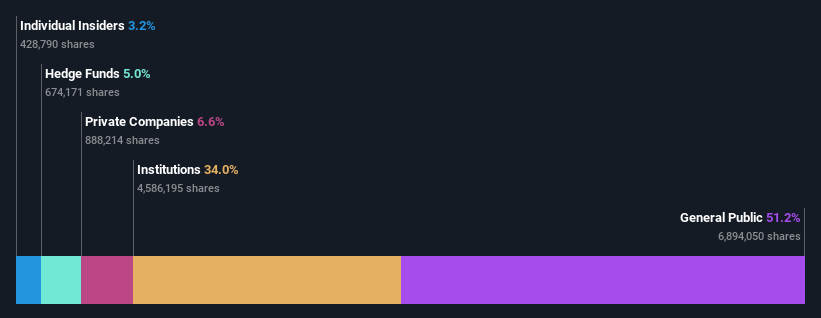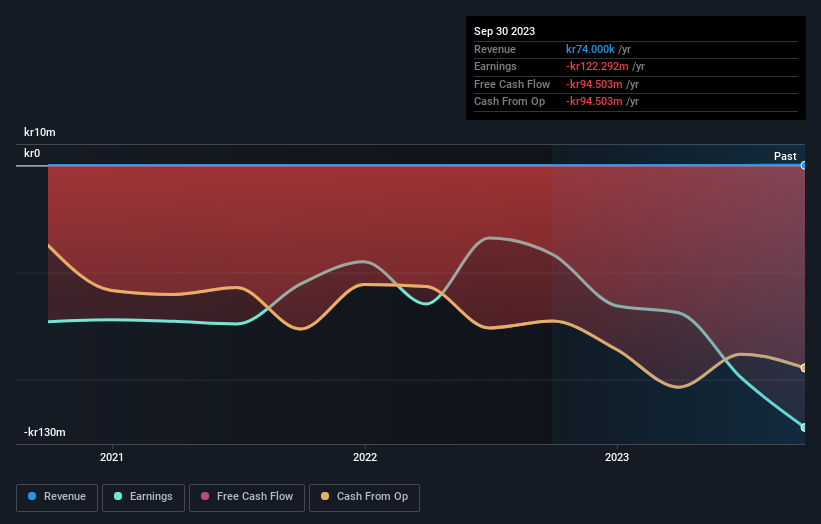Infant Bacterial Therapeutics AB (publ) (STO:IBT B) surges 14%; individual investors who own 51% shares profited along with institutions

Key Insights
- Infant Bacterial Therapeutics' significant individual investors ownership suggests that the key decisions are influenced by shareholders from the larger public
- A total of 25 investors have a majority stake in the company with 49% ownership
- Insiders have been buying lately
To get a sense of who is truly in control of Infant Bacterial Therapeutics AB (publ) (STO:IBT B), it is important to understand the ownership structure of the business. We can see that individual investors own the lion's share in the company with 51% ownership. In other words, the group stands to gain the most (or lose the most) from their investment into the company.
While individual investors were the group that reaped the most benefits after last week’s 14% price gain, institutions also received a 34% cut.
In the chart below, we zoom in on the different ownership groups of Infant Bacterial Therapeutics.
View our latest analysis for Infant Bacterial Therapeutics

What Does The Institutional Ownership Tell Us About Infant Bacterial Therapeutics?
Many institutions measure their performance against an index that approximates the local market. So they usually pay more attention to companies that are included in major indices.
As you can see, institutional investors have a fair amount of stake in Infant Bacterial Therapeutics. This suggests some credibility amongst professional investors. But we can't rely on that fact alone since institutions make bad investments sometimes, just like everyone does. When multiple institutions own a stock, there's always a risk that they are in a 'crowded trade'. When such a trade goes wrong, multiple parties may compete to sell stock fast. This risk is higher in a company without a history of growth. You can see Infant Bacterial Therapeutics' historic earnings and revenue below, but keep in mind there's always more to the story.

It looks like hedge funds own 5.0% of Infant Bacterial Therapeutics shares. That's interesting, because hedge funds can be quite active and activist. Many look for medium term catalysts that will drive the share price higher. The company's largest shareholder is SIX Group AG, Asset Management Arm, with ownership of 8.9%. In comparison, the second and third largest shareholders hold about 6.6% and 5.0% of the stock. Furthermore, CEO Staffan Stromberg is the owner of 0.7% of the company's shares.
On studying our ownership data, we found that 25 of the top shareholders collectively own less than 50% of the share register, implying that no single individual has a majority interest.
While it makes sense to study institutional ownership data for a company, it also makes sense to study analyst sentiments to know which way the wind is blowing. Our information suggests that there isn't any analyst coverage of the stock, so it is probably little known.
Insider Ownership Of Infant Bacterial Therapeutics
While the precise definition of an insider can be subjective, almost everyone considers board members to be insiders. Company management run the business, but the CEO will answer to the board, even if he or she is a member of it.
I generally consider insider ownership to be a good thing. However, on some occasions it makes it more difficult for other shareholders to hold the board accountable for decisions.
We can see that insiders own shares in Infant Bacterial Therapeutics AB (publ). In their own names, insiders own kr45m worth of stock in the kr1.4b company. It is good to see some investment by insiders, but we usually like to see higher insider holdings. It might be worth checking if those insiders have been buying.
General Public Ownership
The general public, who are usually individual investors, hold a substantial 51% stake in Infant Bacterial Therapeutics, suggesting it is a fairly popular stock. This level of ownership gives investors from the wider public some power to sway key policy decisions such as board composition, executive compensation, and the dividend payout ratio.
Private Company Ownership
Our data indicates that Private Companies hold 6.6%, of the company's shares. Private companies may be related parties. Sometimes insiders have an interest in a public company through a holding in a private company, rather than in their own capacity as an individual. While it's hard to draw any broad stroke conclusions, it is worth noting as an area for further research.
Next Steps:
It's always worth thinking about the different groups who own shares in a company. But to understand Infant Bacterial Therapeutics better, we need to consider many other factors. Consider for instance, the ever-present spectre of investment risk. We've identified 3 warning signs with Infant Bacterial Therapeutics (at least 2 which shouldn't be ignored) , and understanding them should be part of your investment process.
Of course, you might find a fantastic investment by looking elsewhere. So take a peek at this free list of interesting companies.
NB: Figures in this article are calculated using data from the last twelve months, which refer to the 12-month period ending on the last date of the month the financial statement is dated. This may not be consistent with full year annual report figures.
New: AI Stock Screener & Alerts
Our new AI Stock Screener scans the market every day to uncover opportunities.
• Dividend Powerhouses (3%+ Yield)
• Undervalued Small Caps with Insider Buying
• High growth Tech and AI Companies
Or build your own from over 50 metrics.
Have feedback on this article? Concerned about the content? Get in touch with us directly. Alternatively, email editorial-team (at) simplywallst.com.
This article by Simply Wall St is general in nature. We provide commentary based on historical data and analyst forecasts only using an unbiased methodology and our articles are not intended to be financial advice. It does not constitute a recommendation to buy or sell any stock, and does not take account of your objectives, or your financial situation. We aim to bring you long-term focused analysis driven by fundamental data. Note that our analysis may not factor in the latest price-sensitive company announcements or qualitative material. Simply Wall St has no position in any stocks mentioned.
About OM:IBT B
Infant Bacterial Therapeutics
A clinical stage pharmaceutical company, develops drugs to prevent serious neonatal diseases affecting premature infants in Sweden.
Flawless balance sheet very low.

